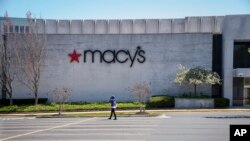Millions of U.S. workers are losing their jobs in a surge of layoffs as businesses large and small shut their operations amid the coronavirus pandemic.
A week ago, nearly 3.3 million workers filed for unemployment benefits. The figure is expected to rise rapidly in the coming weeks, with 40 million people predicted to be unemployed by mid-April.
Before the pandemic struck the United States, 5.8 million U.S. workers were unemployed — 3.5% of the workforce of 164.6 million. That figure had changed little in the past six months and was a linchpin of a robust economy.
Now, the world’s largest economy has been hurt by what President Donald Trump describes as the “horrible scourge” of the coronavirus.
On Tuesday, investment banker Goldman Sachs Group forecast a far steeper decline in the U.S. than it had previously, predicting that output of goods and services would plunge by an annualized 34% in the April-to-June period, compared to its earlier estimate of 24%.
Goldman Sachs economists said the U.S. jobless rate would soar to 15% by mid-year, an estimate that would leave 25 million workers unemployed. Its earlier estimate was for a 9% jobless rate.
James Bullard, president of the Federal Reserve Bank of St. Louis (in the midwestern state of Missouri), predicted the unemployment rate may climb to 30% in the second quarter because of the business shutdowns, with a plunging 50% drop in the gross domestic product.
An estimated 190,000 stores have closed, making that about 50% of retail space. On Monday alone, major retailers Macy’s, Kohl’s and Gap announced that collectively, they are laying off 290,000 workers.
In Washington, D.C., the John F. Kennedy Center for the Performing Arts furloughed the 96 musicians playing for the National Symphony Orchestra without pay, even though the U.S. Congress just last week approved a $25 million rescue fund for the cultural hub, where all performances have been canceled.
Some employers initially said they would continue to pay their workers, but many of those decisions have quickly been scrapped because of uncertainty on how the coronavirus might spread or when the pandemic will end.
Global management consulting firm Mckinsey & Company says a quarter of U.S. households already live from paycheck to paycheck, with 40% of Americans unable to cover an unexpected expense of $400 without borrowing.
The $2 trillion rescue package approved by Congress last week and signed into law by Trump calls for enhanced unemployment compensation for laid-off workers. States normally pay jobless workers a fraction of their normal pay, but the national assistance plan will add $600 a week in extra pay for the next four months if workers are unemployed for that length of time.
Goldman Sachs economists say they expect a significant recovery in the July-to-September period, with the GDP expanding by 19%.
“Our estimates imply that a bit more than half of the near-term output decline is made up by year-end,” they wrote.
State governments across a wide swath of the U.S. have ordered millions of Americans to stay home in the coming weeks, except to buy groceries, purchase carry-out food, go to medical appointments or exercise by themselves or with family members.
Such orders have forced many businesses deemed not essential to close their doors, although the term, “essential,” has varied among the 50 states, leading to a patchwork of functioning commerce depending on where one lives.







